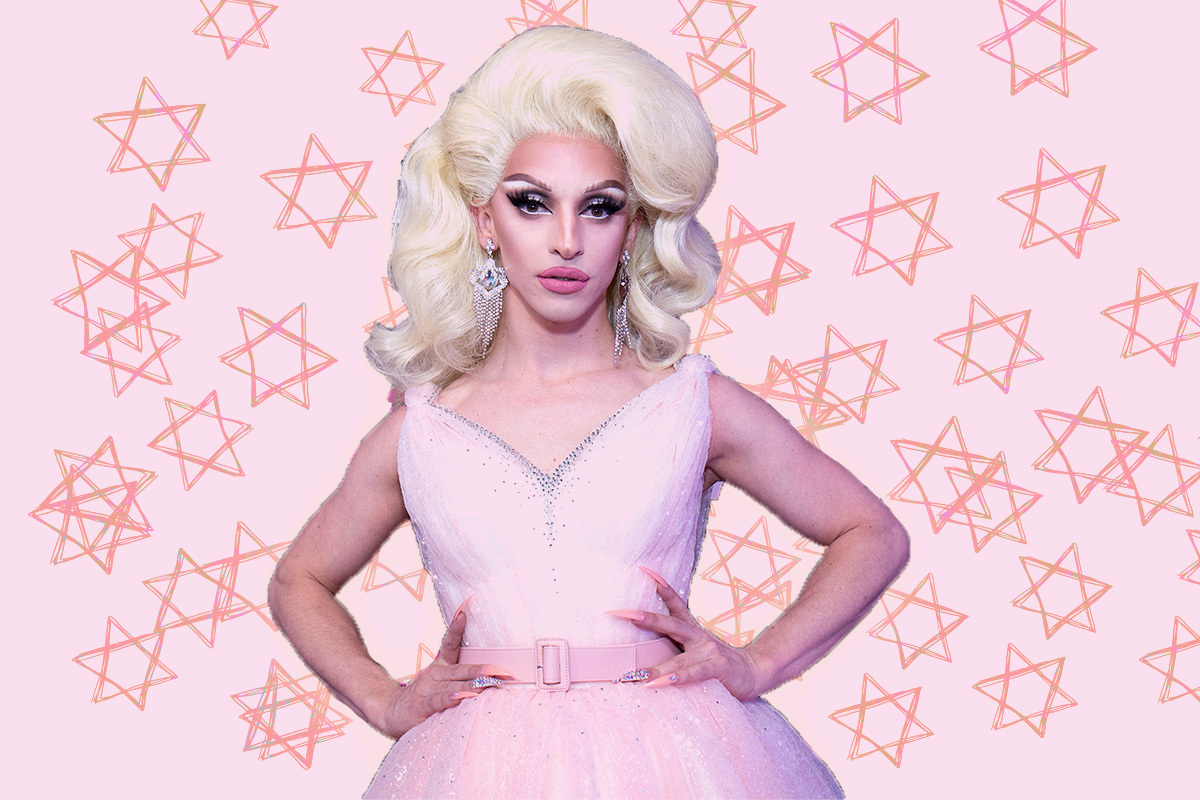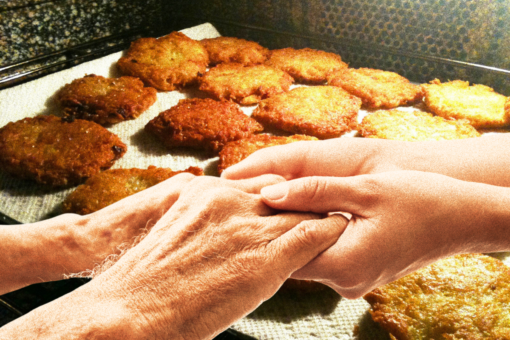There is a long legacy of Jewish drag artists, and there have been many Jewish drag queens to grace the Werk Room of “RuPaul’s Drag Race,” but few have integrated their Judaism into their drag as much as “All-Star’s 5” runner-up and season 10 contestant Miz Cracker. A self-proclaimed “Jewish Barbie on bath salts,” Miz Cracker’s comedy is based around her life, her Judaism, and the idea of womanhood.
“Every major influence in my life has been a woman, from my mother and sister who raised me to my copilot and quasi-manager, Katelyn, who helped me develop my entire brand. Women are such an important part of my life,” Miz Cracker says. “I can’t imagine doing the show for anyone else but for women.”
Between planning her tour, producing her She’s a Woman podcast, and serving gag-worthy looks, the 37-year-old New York City-based Jewish drag queen and comedian talked with Alma over the phone about the many ways her Jewish identity has influenced her work. As expected, she’s kind, hilarious, and the type of person your bubbe would kvell over.
However, she wasn’t always the polished and poised drag queen we see on our screens. Initially, she was skeptical about trying drag when “Drag Race” season eight winner Bob the Drag Queen encouraged her to try it. After six months of “nagging,” Bob became Miz Cracker’s drag mother when she convinced her to put on drag for the first time. Even then, the persona that is Miz Cracker took years to become fully realized.
“Miz Cracker slowly developed over the years of interacting with audiences and finding out who I felt like when I was on the mic, and what worked and what didn’t. And it’s really just about learning to socialize yourself like a toddler — that’s what drag queens go through, trying to figure out who they are.”
The same goes for finding her comedic voice as well. While Miz Cracker mentioned that she has always loved Jewish comedians like Sarah Silverman and Mel Brooks, she felt that her only true comedic influence was herself. Much of her comedy is rehashing the mundane trials and tribulations of her life “and making my story from tragedy into comedy, which is also a very Jewish thing.”
At its heart, Miz Cracker’s comedy is rooted in its Jewishness; in addition to her catchphrase “Shabbat shablam!” one only needs to hear the puns, well-calculated quips and pervasive wit of her jokes to know that she is Jewish. Learning “the art of complaining” from her grandmother, there is an innate Jewishness in how she speaks and thinks. When describing how her Judaism influences her comedy, she immediately mentioned “Rashi,” “the Jewish tendency to read into things and our readings of the Torah,” and “Jewish skepticism.” That skepticism, and long-rooted Jewish mindsets (and non-Jewish pushback against those perspectives), flavor her work and give Jewish fans plenty to identify with.
“I think other Jews empathize when my humor is called too bitter, or too this or too that. Other Jews are like, ‘we’re always accused of being too bitter. We’re always accused of being sneaky. We’re always accused of being this or that.’ And so I think there’s a lot of the Jewish experience in my drag experience.”
When it comes to her act, Miz Cracker has been driven to present a more accurate depiction of what it means to be Jewish. While there is some Jewish representation in drag — Alexis Michelle, Sasha Velour, Lady SinAGaga, and Sherry Vine, to name a few — like in most fields, Jews remain a minority. Often the only comedy associated with Jewish people in the drag community is Anne Frank and Holocaust jokes, but Miz Cracker hopes to push the boundaries and create more nuanced Jewish comedy for drag fans through education.
“I think that people need to know more about Judaism and about Jewishness in the drag community so that there’s a richer understanding than just Holocaust jokes,” Miz Cracker says. Within that “richer understanding,” she wants both drag queens and fans of drags to learn more about Jewish history and “how we suffered,” but also a larger cultural understanding of Judaism beyond the traditional stereotypes prescribed toward Jewish people by the media.
She repeatedly emphasized how much it means to her when fans empathize with her Jewish humor, as “Jewishness is a sense of family and recognition.” Not only has she found that a loud-and-proud Jewish Miz Cracker made others happy, but more importantly, it makes her smile, too.
Miz Cracker spent her early years living in the Lubavitch community in Seattle, but now says her relationship with Judaism is mostly cultural. However, she discovered that her connection with Judaism actually increased as she became more secular. Despite not practicing at the same frequency, Judaism soon began to feel like “something [she] inherited,” referencing the idea of collective memory within the Jewish community.
In leaving the Lubavitch community with her family and becoming more secular, Miz Cracker’s status as “the other” became a lot more present. In entering a “very Christian community” in Seattle, she began to focus more on how she was viewed as a Jewish person. This translated into other parts of her life — Miz Cracker cited the Jewish need to analyze situations and the Torah as one of the reasons why she was described as “overthinking” during her initial season on “Drag Race.”
“If you think about Jewishness, you think about returning to the Torah to a text and going over it and over it and over it and thinking about it in many different … that could mean this, it could mean that, that could mean this … I think that plays a big part in my overthinking, you know? Feeling different.”
That feeling of being “different” is one she explicitly ties to being Jewish. Between a strong cultural perspective and the existance of antisemitism, she explains, Jewish people will always be viewed through their Judaism no matter their level of religiosity or involvement in the Jewish community. That’s exactly why Miz Cracker is extremely passionate about Jewish people accepting their Judaism and being proud of their culture.
“I always want people to claim their Jewishness. Some people are like, ‘Oh, no, I’m not Jewish, I don’t go to synagogue.’ I’m like, ‘Well, you may not seem to think that you’re Jewish, but an outsider definitely will. So they’ll see you as Jewish, so you should know about that thing that other people are going to call you and judge you for.’”
Still, coming into season 10 of “RuPaul’s Drag Race,” Miz Cracker feared being framed as “the Jewish queen” and being minimized into a caricature. It was only after watching herself when it was airing that she realized she “refer[s] to [her] Jewishness all the time.” It was not the producers who would make her into “the Jewish queen,” but rather that was a part of her identity both in and out of drag. “I am the Jewish queen. And that’s what I like, I owned it and began to love it,” she says with a laugh.
An advocate for equal rights for all, Miz Cracker stresses the importance of Jewish people using their voices and their “otherness” to not only uplift other Jews, but those of all marginalized communities. Especially in today’s American political climate, where there is the continued push by the Black Lives Matter movement and advocacy against anti-Asian and anti-Pacific Islander racism, she emphasizes the importance of all those who have been othered to stand up and stand together.
“It’s all part of that important work of people saying enough is enough for racism, enough is enough for prejudice. I think that’s all part of the same work,” she says.
Drag particularly has been a way to express her activism. She initially tried drag to advocate for marriage equality. Her 2020 tour “American Woman” dealt with the unequal treatment women face and discusses sexual harassment. She recognizes fellow “All-Stars 5” runner-up Jujubee and “All-Stars 5” winner, Shea Couleé, as being crucial in depicting beauty for marginalized women. According to Miz Cracker, Jujubee’s drag is “showing people that there’s incredible Asian beauty” and Shea has referred to her drag as a “love letter to Black women.” For all three queens, drag has been used as “a tool for saying you can be beautiful no matter who you are.”
“Superficial beauty is a toy in the game,” she says, whereas real beauty is “confidence and self-acceptance.” For Miz Cracker, much of her drag is centered around presenting a beautiful, luxurious Jewish woman who does not need to hide her Judaism. While she feels that Jewish people are still “dealing with that sneaky big nose Shylock Jew stereotype,” in creating Miz Cracker, she hopes that the traits Jewish people have been mocked and villainized for can be accepted and seen as sexy. Part of that mentality is reclaiming many aspects of Judaism people condemn, such as the Jewish American Princess stereotype.
“I do consider [Miz Cracker] a Jewish American Princess. In both making fun of that stereotype and embracing it and loving it, pulling it apart and celebrating at the same time,” she says. “Why are Jews not allowed to be over the top and glamorous? When you look at our representation in the media, the only things that we get Oscars for are Jewish stories of us dying. I want to have an image of Jewishness that’s award-winning and something to be celebrated.”
In creating Miz Cracker as a Jewish American Princess, she hopes to show the world that “Jewishness is beautiful.” She hopes that by being so open about her Judaism and loving what many, many describe as traditional Ashkenazi features she can show the world, “Hey, I am a Jew with a big nose and I’m gorgeous.”
“I want people to feel that there’s still beauty in the world and that you can make it yourself,” Miz Cracker says. “Because here I am, just a mousy Jewish boy, and I’m a beauty in my world, and I make beauty for the world. So you can do it, too, if I can do it, damn it.”



